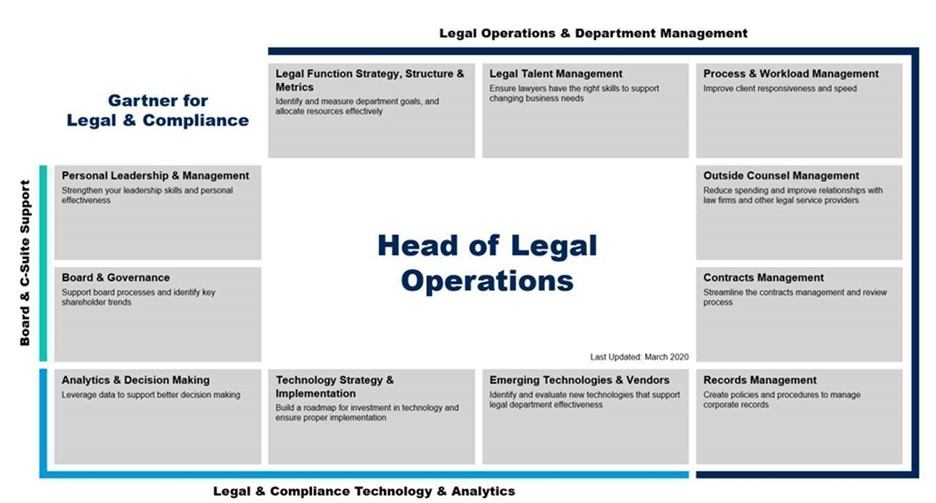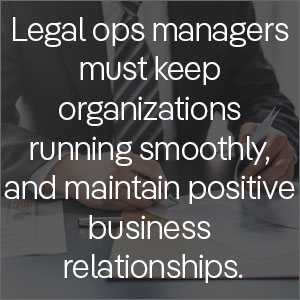Increasingly, legal operations teams are becoming essential — and downright urgent — in legal departments, as more and more companies realize the benefits of having legal operations professionals aboard. That’s partly because legal departments, themselves, have needed to take on more responsibilities and become more versatile. They must better manage thousands of legal documents, keep up with global compliance regulations, and — generally speaking — operate more efficiently and effectively while reducing costs.
To help legal teams with this, though, legal operations managers must possess a certain skill set to keep legal and organizations running smoothly, and maintain positive business relationships altogether. Gartner’s Legal and Compliance graphic below highlights the specific skills the heads of legal operations should have. They are related to workload management, senior leadership, and high-level decision-making.

Further to this list, here are three top skills companies look for in a legal operations manager:
Working Efficiently and Effectively
As noted above, legal departments play an important role in organizations today. Among other things, they are responsible for ensuring smooth communication between departments, and developing and maintaining positive relationships with clients and outside vendors. They are heavily relied on for legal management — including storing, authoring, negotiating, and reviewing contracts — and compliance, when it comes to LIBOR, GDPR, and more. In fact, contracts represent a significant percentage of legal departments’ responsibilities.
To assist with the resolution of compliance issues and the mitigation of risks, then, legal operations managers must take on the role of increasing and maintaining legal’s efficiency. Fortunately, though, this particular job is now facilitated by legal technology in the form of legal automation systems.
Handling Budgets and Controlling Costs
Legal operations managers also have an important role to play when it comes to handling legal budgets and controlling legal costs. This means looking at past budgets and planning future ones. Legal tech, for example, may need to be upgraded, or adopted and implemented to increase departmental efficiencies.
The legal operations manager must then use their knowledge and awareness of how much the legal department needs, before consulting with finance teams and planning appropriate budgets to lower overall costs.
Planning for — and Keeping up to Date with —Legal Technology
Legal tech is no longer a ‘nice-to-have’ for corporate legal departments. It’s a ‘must-have.’ This is especially true given most employees are still working remotely, yet collaboratively.
What’s more, with the average company holding 20,000 to 40,000 active contracts at a time, managing them all manually isn’t the least bit feasible anymore. As a result, it’s crucial that legal operations managers keep up to date — and keep their options open — when it comes to evolving technologies.
They must then find reliable software and come up with a technology implementation roadmap, to keep contracts in a central repository, automate workflows and streamline processes, and help the corporate legal department work more collaboratively and effectively.
Developing Best Practices for Legal Operations Managers
When all is said and done, corporate legal departments will be an increasingly essential part of everyday operations within organizations. Accordingly, legal operations professionals should sharply focus on how legal teams are functioning today, to help lawyers work that much better in the future.
The good news is the skills mentioned above can help you adapt to the changes in the legal profession, adopt new technologies like end-to-end legal management platforms, and operate legal departments in the most efficient, effective manner. They will help you maximize the value of legal altogether.
So, are you looking to invest in legal management software? Check out our CLM Impact Research Report to find out how ContractPodAi Cloud can streamline your own day-to-day workflows.
Author:

Jerry Levine
Connect with us on Linkedin





